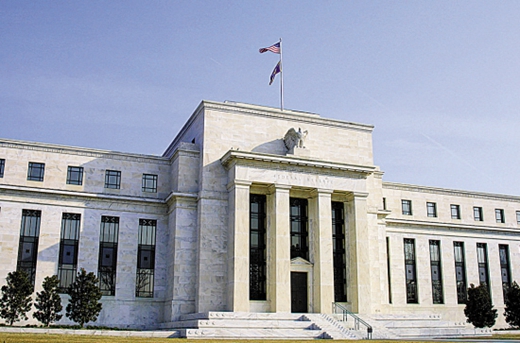

Given the deep scars caused by the 2008 financial crisis, most economists agree that aggressive response by major central banks was appropriate. But now some observers are asking whether the cross-border spillovers of monetary authorities deserve scrutiny. The question arises: if an action of a central bank has direct effects on other economies, should it try to coordinate its policies? How much information should it share with other monetary authorities? And, when conduct is deemed to have adverse effects on neighboring or distant countries, should a forum for “official complaints” exist?

The U.S. Federal Reserve in Washington, D.C. (File Photo/Xinhua)
First, it is important to note that central banks have mostly been attempting to provide economic stimulus in recent years. They usually succeeded in boosting demand. When the U.S. Federal Reserve and the European Central Bank decreased interest rates, they ensured that the economic recession was shorter, thereby allowing American and European consumers to purchase goods made in China or any other country.
Second, any analysis of post-crisis monetary policy needs to emphasize that central banks have not engaged in “currency wars”. They generally resisted a temptation to create unfair advantages for domestic exporters by deliberately and artificially keeping currency values low for sustained periods of time. This is apparent by the fact that instances of excessive inflation have been rare in the last eight years. Several central banks in advanced economies have, in fact, kept inflation at very low levels. A reasonable argument could be made that, especially in Europe, ambitious monetary policy should have come sooner.
Third, even though all central banks concentrate their attention on their domestic economies, they already have good “selfish reasons” not to behave irresponsibly. They realize that instability in other countries would normally affect their own objectives in a counterproductive manner.
Finally, many economic discussions are dominated by the notion that monetary policy - the setting of interest rates and also movements in the value of a country’s currency - have potentially large effects on other countries. The argument is that when central banks carry out policy changes, such as adjustments in interest rates, they should be mindful of their effects on trading partners, foreign investors, and other international counterparts. But it is sometimes forgotten that monetary policy is not the only type of policy that can produce spillover effects.
Consider what happens when fiscal policy becomes less strict. When citizens receive more public services or enjoy greater welfare protection, it means that the immediate need for saving decreases. Even if governments do not intend to encourage private spending, fiscal policy (the amount spent by central and local governments) will often result in changes in consumer behavior. If, for example, French citizens do not feel compelled to save, it means that they are more likely to purchase cars, many of which are produced in Germany. That is, a neighbor of France can be a beneficiary of a new fiscal arrangement – note that these decisions have nothing to do with activities of central banks.
One could argue that monetary authorities receive too much attention, which at times morphs into blame. Admittedly, it is true that their decisions can be disruptive. When not anticipated, their actions can shock markets, and have unintended consequences. But the focus on the monetary domain could distract us from developments in the fiscal sphere. When a country becomes too indebted, for instance, the resulting shock from bankruptcy can be extremely serious.
These four considerations suggest that concerns about possible spillovers of monetary policy should not be overplayed.
And yet, the global economy is changing in fundamental ways, due to population aging, low productivity growth, and economic polarization. In this environment, vigilance will be essential. Central banks have avoided hurting other economies, but that does not imply that we can afford to be complacent.
Going forward, if central banks in emerging economies will view the actions of other central banks as a threat, open lines of communication will be indispensable. The architects of economic policies need to listen to their peers, as they may not fully realize how far the consequences of their own decisions reverberate beyond the borders of their own countries.
Indeed, there is statistical evidence that some countries are vulnerable to changes in US monetary policy. The intensity of the exposure depends on various factors, such as local financial development and participation in global value chains. Some of these countries benefited from US monetary policy until 2013, but they also incurred more pain when the Fed signaled its intention to provide less stimulus. It is possible, moreover, to argue that when the Fed tried to “put down the fire” in the US in 2009-2010, it may have played a role in the overheating of countries like Brazil, and even China.
The solution to this conundrum is not, however, to ask the Fed to keep guessing what effects it may have abroad. It is better for all countries to work toward ensuring that their own economies are resilient. They can do so by promoting those policies that raise efficiency and, at the same time, allow the majority of citizens to raise their living standards.
 World's fastest bullet train to start operating next month
World's fastest bullet train to start operating next month Huangluo: China's 'long hair village'
Huangluo: China's 'long hair village' Spectacular bridge with one of the tallest piers in the world
Spectacular bridge with one of the tallest piers in the world Magnificent view of Hukou Waterfall
Magnificent view of Hukou Waterfall A glimpse of Stride 2016 Zhurihe B military drill
A glimpse of Stride 2016 Zhurihe B military drill US Navy chief tours Liaoning aircraft carrier
US Navy chief tours Liaoning aircraft carrier Chinese American woman wins Miss Michigan
Chinese American woman wins Miss Michigan Centenarian couple takes first wedding photos
Centenarian couple takes first wedding photos Traditional Tibetan costumes presented during fashion show
Traditional Tibetan costumes presented during fashion show Top 10 livable Chinese cities
Top 10 livable Chinese cities Top 20 hottest women in the world in 2014
Top 20 hottest women in the world in 2014 Top 10 hardest languages to learn
Top 10 hardest languages to learn China’s Top 10 Unique Bridges, Highways and Roads
China’s Top 10 Unique Bridges, Highways and Roads Stop politicizing doping: observer
Stop politicizing doping: observer Weibo explodes over news of actor’s divorce
Weibo explodes over news of actor’s divorce Japanese teacher spends decades researching Nanjing Massacre
Japanese teacher spends decades researching Nanjing Massacre After 2 years of regulatory limbo, govt to legalize popular QR code payment services
After 2 years of regulatory limbo, govt to legalize popular QR code payment servicesDay|Week